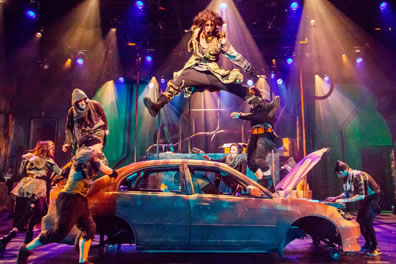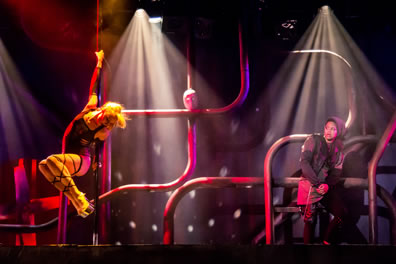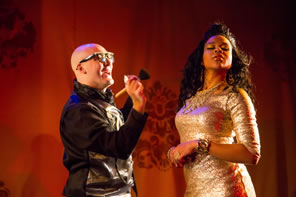As You Like It
The Sound of Silence
Synetic Theater, Arlington, Virginia
Saturday, December 12, 2015, E–103&104 (center stalls)
Directed by Paata Tsikurishvili

The street people dance on, around, and above the abandoned car as Amiens (Konstantine Lortkipanidze, right) plays his keyboards in the automobile's hood in Synetic Theater's production of William Shakespeare's As You Like It. Photo by Johnny Shryock, Synetic Theater.
U.S. Senator James Lankford of Oklahoma issued a report on government waste last November that he titled “Federal Fumbles: 100 Ways the Government Dropped the Ball.” The second entry in his 145-page report, “Silent Shakespeare,” takes aim at National Endowment of the Arts (NEA) funding of theater programs, particularly those that helped fund Synetic Theater in Arlington, Virginia, which has produced a dozen award-winning "Silent Shakespeare" productions. Based on the language he used in his report, Lankford’s beef wasn’t so much the funding for the arts but that money—federal or even private—should go toward something as seemingly ridiculous as “silent Shakespeare.”
I’m quoting from the report here: “William Shakespeare was lauded for many things: his meter, his verse, his complicated characters. Generations of families have come together to enjoy productions of Shakespeare’s sonnets and plays by film companies, local theaters, and high school drama classes. But was Polonius right in Hamlet when he said, ‘Give every man thy ear, but few thy voice’? James Bovard published a piece in The Wall Street Journal on July 13, 2015, entitled, ‘A Silenced Shakespeare in Washington: Shakespeare without puns is like French cooking without butter.’ Performing Shakespeare’s plays using private funds or state-funded arts programs might be even ‘butter.’”
I won’t comment on the senator’s own punning skills (especially his extensive use of American football imagery throughout his report, many of the Hail Mary variety of overreach). However, I can’t help pointing out that Lankford, and The Wall Street Journal’s Boyard, as well, apparently are not aware that dance, ballet, and mime are forms of art without words, and that Shakespeare has been presented using such mediums for more than a century: Synetic just combines the three mediums into a new dynamic telling of the plays. Lankford and Boyard also apparently are not aware that another Capitol Region theater company presents “silent Shakespeare”: Faction of Fools, based at Gallaudet University and casting that college’s Deaf theater students in its productions.
Furthermore, appreciators of Shakespeare laud his use of imagery in addition to his meter, his verse, and his “complicated characters.” In fact, those complicated characters rely more on Shakespeare’s employment of allegorical language than on the verse they speak (especially as many of the most complicated don’t always speak verse). Fact: imagery and the characters who use it sometimes can be expressed more profoundly, and to a wider audience, visually rather than aurally.
The Webverse and media lit up with ridiculing comments about “Silent Shakespeare” (but not as much as media and commentators went crazy over the first item in the report, the “$43 Million Gas Station” in Iraq, though that, as with Synetic's Shakespeare productions, Lankford also failed to accurately portray in its full context). Thus, Synetic was on the defensive when, just a month after Lankford released his “Fumbles,” the company opened its already-scheduled production of Shakespeare’s As You Like It, its 12th Silent Shakespeare outing. In his preshow introduction on opening night, Synetic’s Founding Artistic Director Paata Tsikurishvili, who helmed the production, called it “As You Like It: Shakespeare beyond Words,” and the company posted on its website an essay explaining the purposes to what it now prefers to call “Wordless Shakespeare.”
I never got around to writing my review of Synetic’s As You Like It, waylaid in the shuffle of this mortal coil, but I’m prompted to do so now having just written my account of seeing the play presented this summer by the Children’s Shakespeare Theatre in New York. It also seems a perfect time to address the validity of such nontraditional efforts in the Shakespearean realm. I won’t address directly the merit of government funding for Silent Shakespeare (I accept government funding for the arts in general on the reasoning that it improves the education, cultural awareness, and commercial opportunities of the general population, contributing to a nation that positions itself as the “City upon a Hill” for the rest of the world). However, I will address why staging “Silent Shakespeare” matters and should be beyond reproach.
Synetic’s Wordless Shakespeare productions are always good theater, whether you like Shakespeare or not, and this As You Like It is no exception. With choreography by Paata’s wife, Irina Tsikurishvili, Synetic combines dance with mime and physical expressionistic performances to present its stories. In addition to the artistic team and talented performers, a creative technical team (Anastasia Simes as set designer, Brian Allard as lighting designer, Kendra Rai as costume designer, and Thomas Sowers as sound designer) transforms Synetic’s tiny Crystal City theater into a venue with vast landscapes. As You Like It uses urban scenes ranging from the wealthy skyscraper palace of Duke Frederick to a ghetto with decayed city infrastructure and an abandoned car where the exiled Duke Senior (both dukes are played by Synetic founding artist Irakli Kavsadze) joins a band of bohemian artisans beset by feral street people. The set, lighting, costumes, and sound are all part of the spectacle.
Ah, sound in “Silent Shakespeare.” The reason Paata Tsikurishvili now prefers to call his productions “Wordless Shakespeare” is because of how much they rely on original music. That music is written by Konstantine Lortkipanidze, whose work Tsikurishvili sees as translating Shakespeare’s texts into a sonic script for the performers. In As You Like It, Lortkipanidze also plays Amiens, whose bank of keyboards sits inside the hood of the abandoned car. One of the highlights of this production sees Lortkipanidze’s Amiens on his keyboards jamming with Touchstone (Will Hayes) on guitar.
It’s one of many musically visual highlights in this production. After Touchstone, Rosalind (Taylor Robinson), and Celia (Sharisse Taylor) arrive in the ghetto they have to fend off aggressive birds, bats, mice, and cockroaches. Touchstone, playing guitar, does a duet with Audrey (Francesca Blume), whose instrument is tap-dancing. Orlando (Synetic Theater founding company member Philip Fletcher) builds a model of Rosalind out of junk and dances with it. And, Phoebe performs a pole dance. Laura Artesi plays the young shepherdess (here portrayed as an exotic dancer) who pursues Ganymede (Rosalind disguised as a young boy), a subplot in Shakespeare's play that translates hilariously into visual humor here. Phoebe’s most aggressive move is to handcuff Rosalind/Ganymede to a pipe and perform her pole dance. Artesi’s lithe serpentine moves are heart-racing and jaw-dropping. I’m thinking through other Shakespeare texts wondering which might lend themselves to another such use of Artesi’s singularly incredible dancing talent on top of her acting skills (Comedy of Errors comes to mind). If this be Shakespeare, give me excess of it.

Phoebe (Laura Artesi) performs a pole dance for Rosalind (Taylor Robinson) disguised as Ganymede, who is chained to a pipe on the right in Synetic Theater's production of William Shakespeare's As You Like It. In the center is Jaques's mask. Photo by Johnny Shryock, Synetic Theater.
It’s not entirely Shakespeare, however. Tsikurishvili always takes liberties with Shakespeare’s plots and characters, often showing greater service to his physical performance medium than to the texts (ballet choreographers do the same thing). In his adaptation of As You Like It, Touchstone is a body guard in Duke Senior’s household rather than a jester-like character, and Audrey is a body guard for Duke Frederick who is crushing on Oliver (Scott Turner). When Oliver rejects Audrey once too often (he’s got his social-climbing sights set on Celia), Audrey joins up with the street people, where her onetime foe, Touchstone, becomes a new love interest. Both Oliver and Orlando also start out in the employ of Duke Frederick. After Frederick’s hostile takeover of his brother’s gang-like empire, Orlando, who already has been seeing Rosalind on the sly, stands up for his love, attacking Oliver which leads to a great Orlando–Audrey showdown. These plot tweaks—OK, plot upheavals—bolster the dance quotient of the production, especially given the individual talents Paata Tsikurishvili has cast for this show, and how well Irina Tsikurishvili uses their range of talent in her choreography.
What Tsikurishvili's adaptations contribute most to an appreciation of Shakespeare is how they present the play's thematic arcs visually and use physical language to explore the characters Shakespeare has drawn so well with words. He doesn’t do that as well with As You Like It as he has in his other Shakespearean efforts, but there are some special such moments in this production nonetheless. One comes in the opening scene, visually laying out a foundation for the dislike Oliver has for his younger brother, Orlando. “My soul, yet I know not why, hates nothing more than he,” Shakespeare has Oliver say. “Yet he’s gentle, never schooled and yet learnèd, full of noble device, of all sorts enchantingly beloved, and indeed so much in the heart of the world, and especially of my own people, who best know him, that I am altogether misprised.” Tsikurishvili stages Oliver’s conflicted feelings by starting the play off with the two brothers in silhouette attending their father’s funeral. The mourners hug, kiss, and make much over one but show a reserved coolness to the other; as they come forward, we see the former is Orlando, the latter is Oliver. Turner plays Oliver with real malevolence, oblivious to its consequences—consequences that inevitably lead him to falling out of favor with Duke Frederick. This leads us to a perfectly sensible reconciliation with Orlando later in the play (we need no hidden serpent or crouching lion to further justify Oliver's redemption).
Robinson has an acting rather than dance background, and it is the former that makes her Rosalind so satisfying. She has a wonderful moment when, now disguised as a boy and having cut her hair, she wakes up, feels for her hair and responds with shock when she realizes it’s gone. Then, she remembers why she cut her hair, and a smile of satisfaction crosses her face: she is free from the social shackles of being a glamour girl. Of course, this is before she is pursued by Phoebe, and before she sees Orlando among the bohemians. Robinson and Fletcher touchingly portray their percolating romance, even when she is in disguise and pretending to be Ganymede.


Rosalind (Taylor Robinson) before exile with Sylvius (Vato Tsikurishvili, top) and as Ganymede with Orlando (Philip Fletcher) in Synetic Theater's "Wordless Shakespeare" production of As You Like It. Photos by Johnny Shryock, Synetic Theater.
Also among the bohemians is a strange, shadowy character with long hair and patchwork coat. This turns out to be Jaques, played by another Synetic mainstay, Scott Brown. An athletic dancer and fine actor, he shows off his miming skills in presenting Jaques’s Seven Ages of Man speech. Wearing a blank mask and using nothing but gestures and posture, Brown starts as an old man then melds seamlessly into the infant and cycles through the speech back to the old man.
This is Shakespeare.
In his “Federal Fumbles” report, Senator Lankford traces the NEA funding through Virginia Commission for the Arts to Synetic in annual grants (the sum of which adds up to only a third of the total cost Lankford cites as waste; he never explains where the rest of the money went). Specifically, Lankford mentions funding for a silent adaptation of Hamlet, which was Synetic’s first Silent Shakespeare production (inspired by a line in Hamlet not quoted in Lankford’s report: “The rest is silence”). The visual imagery of Hamlet’s soliloquies in that production was as deeply poetic, if not more so, than those in most portrayals of Hamlet I’ve seen, even though the Danish prince didn't speak a word. I’m guessing Lankford nor his staff ever saw the production—or if they did, they did so like Oliver at the start of As You Like It with a soul that knows not why it hates.
Hedging against the malevolence of this world is why it matters to me that Shakespeare reaches as wide an audience via as many mediums and methods as possible. Wordless or, for that matter, newly worded Shakespeare (as the Oregon Shakespeare Festival is doing) can lead people afraid of the Bard to greater appreciation of Shakespeare's original texts and stagings. But there’s another, simpler, and more immediate reason why this Wordless Shakespeare version of As You Like It matters. Because my wife was radioactive at the time (treatment for her thyroid cancer, part of our mortal coil of last winter), accompanying me to the opening night performance was my hair stylist, Zalina—no scandal here; I took Zalina’s husband with me to The Merchant of Venice at the Kennedy Center last month when my wife was out of town (both Zalina and her husband love theater, but they aren't able to get out much). Zalina is a native of Uzbekistan, and English is not her native language, so she appreciated watching the imagery- and character-rich story of As You Like It unfold rather than hearing it told. She also recognized the traditional dances of Georgia, the Tsikurishvilis’s native land, incorporated into the choreography, and her pointing this out to me was the butter to my own experience of the production.
I’m quoting from Synetic’s essay “Shakespeare beyond Words; the History of Wordless Shakespeare at Synetic Theater” here: “At first glance, the phrase ‘Wordless Shakespeare’ seems oxymoronic. On the surface, the translation of Shakespeare’s deep characters and complex themes to a stage production without the words that originally gave them life seems improbable. … Shakespeare’s words have always inspired adaptation and invention, from their origins with all-male casts in public theaters and courts to modern productions translated into more than 80 languages and performed around the world. Synetic Theater joins the tradition of novel Shakespeare productions by translating the Bard’s words into the universal language of the body.”
I think that’s worth it.
Eric Minton
August 23, 2016
Comment: e-mail [email protected]
Start a discussion in the Bardroom



 Find additional Shakespeareances
Find additional Shakespeareances